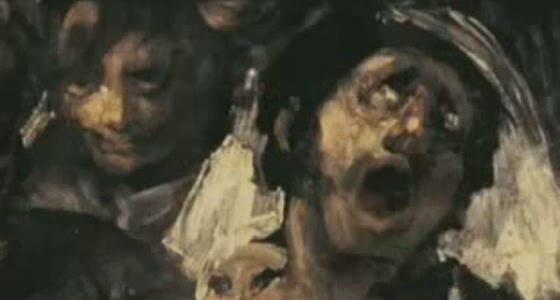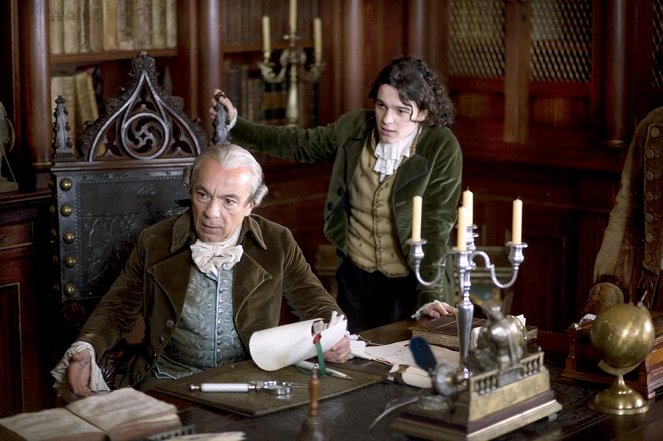Directed by:
Miloš FormanCinematography:
Javier AguirresarobeComposer:
Varhan Orchestrovič BauerCast:
Javier Bardem, Natalie Portman, Stellan Skarsgård, Randy Quaid, José Luis Gómez, Michael Lonsdale, Blanca Portillo, Mabel Rivera, Unax Ugalde (more)Plots(1)
The lives of a great artist, a corrupted holy man, and a beautiful woman cross paths at a crucial moment in history in this epic-scale historical drama. Near the end of the 18th century, Francisco Goya is a gifted but controversial artist whose provocative and often satirical work has earned the enmity of the Spanish government as well as the Catholic Church, who hold tremendous power as the Inquisition rages. Surprisingly, Brother Lorenzo, a monk involved in the Inquisition, has hired Goya to paint a portrait of himself, and to prove to the Inquisitor General he is not in cahoots with the renegade artist, Lorenzo targets Ines, one of Goya's favourite models, as a possible heretic. Under torture from Lorenzo, Ines signs a false confession, and her wealthy and powerful father, Toms Bilbata, offers Lorenzo a taste of his own medicine by brow-beating him into signing a document confessing that his mother was an ape. Lorenzo flees Spain as his reputation lies in tatters, and Goya earns greater infamy as he paints a wildly unflattering portrait of Queen Mara Luisa under commission from her husband, King Carlos IV , but Ines remains in prison because of her coerced confession. Fifteen years later, Lorenzo has become a follower of the Enlightenment, and returns to Spain as Napoleon's forces storm the nation and the Inquisition finally collapses. He attempts to liberate Ines from prison but a shocking discovery awaits him. (CinEast)
(more)Videos (1)
Reviews (9)
The master made an error. A mushy and calculated screenplay, which tries to play at intellectual construction, completely soulless characters (only faint reflections of Forman’s former brilliance in a small character drawing), and a protruding to almost stale directing concept (especially the crowd scenes evoke cheap television productions). Goya is something like product placement – his name stands out nicely, but we can only dream that this is any sort of speculative psychology of genius, albeit simple but lively (Amadeus!). Milking emotions with Natalie Portman's grandma mask and Javier Bardem's satanic frown is not worthy of one of the greatest directors of recent decades. It truly isn’t. This is Forman’s first great mistake.
()
Against the backdrop of the shadowy side of modern Spanish history, Forman once again delivers his spectacular play. It is stunning with its sets, costumes, and, last but not least, an amazing atmosphere that breathes life into Goya's cruelly pessimistic paintings, worth experiencing for 120 minutes. The acting trio works perfectly with the director in their brilliantly acted parts. Stellan Skarsgård IS a Goya, Natalie is great like never before (and it's not just about getting naked here, as subliminal marketing everywhere proclaims), and Javier Bardem's mesmerizing demon literally destroys the screen with his performance. Forman is back in full force after seven years, once again mixing his genres properly, resulting in a stylish spectacle that may not grab you immediately, but resonates all the more when the credits roll.
()
Forget about the nobility of Valmont or the grandeur of Amadeo, this time the viewer is not enough to stare at how harsh it actually looked back then. Even to me, Goya as a whole appears so depressingly that I dare to say that I never want to see it again, because I probably wouldn't endure watching Natalie Portman on the torture rack a second time. And I say this despite the fact that for me, this film is undeniably high-quality, with excellent actors, a great script, and impressive music, and those two hours flew by without me even blinking. The only criticism, in the end, still belongs to Forman and is directed towards the final scene. This "song of death" is everything but impressive and chilling, which is a terrible shame compared to the previous plot.
()
I don't question the message and the strong idea Forman was trying to get across. I will make an odd analogy: while a film such an Amadeus is like a roasted turkey with delicate stuffing, crispy fried potatoes and a hearty vegetable garnish, accompanied a Sauvignon Blanc vintage 2004, Goya's Ghosts evokes a toast with garlic and a glass of sparkling mineral water. Nothing wrong with that, it will fill you up, but with a different end result for your taste buds :)
()
This film didn't grip me as much as I thought it would almost ten years ago, but over the years, I see that the criticism, not only of the church but primarily of humanity, is simply effective and shows the ugliness hidden within us, which surfaces when given the opportunity and when we allow evil to prevail.
()



Ads